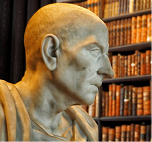Alan Sugar (from ‘Alan Sugar. What You See is What You Get. My Biography’)
He's outspoken, he's blunt, and he's not always popular – but he is always honest. And finally, he's ready to tell the full story of his life, revealing how the boy from a Clapton council estate became Lord Sugar of Clapton, a life peer, multi-millionaire and television star. As he puts it: 'a journey from Clapton to Clapton'. Alan Sugar was brought up in London's East End. As a kid he. watched his dad struggle to support the family, never knowing from one week to the next if he'd have a job. It had a huge impact on him, fuelling a drive to succeed that was to earn him a sizeable personal fortune. Now he describes his amazing journey, from schoolboy enterprises rises like brewing and selling his own ginger beer to setting up his own company at nineteen; from Amstrad's groundbreaking ventures in hi-fi and computers, which made him the darling of the stock exchange, to the dark days when the company almost went under. He talks about his battles as chairman of Tottenham Hotspur FC and the terrible toll they took on him. He also shares the story of how he met his wife of over forty years and how he has drawn strength from his family. He takes us into the world of The Apprentice, and describes his appointment as advisor to the Labour government and elevation to the peerage in 2009. “What you See Is What You Get” is the forthright, funny and sometimes controversial life of one of our greatest entrepreneurs.
Steve Jobs (from ‘Steve Jobs’ by Walter Isaacson)
This book is about the roller-coaster life and searingly intense personality of a creative entrepreneur whose passion for perfection and ferocious drive revolutionized six industries: personal computers, animated movies, music, phones, tablet computing, and digital publishing. You might even add a seventh, retail stores, which Jobs did not quite revolutionize but did reimagine. In addition, he opened the way for a new market for digital content based on apps rather than just web-sites. Along the way he produced not only transforming products but also, on his second try, a lasting company, endowed with his DNA, that is filled with creative designers and daredevil engineers who could carry forward his vision. In August 2011, right before he stepped down as CEO, the enterprise he started in his parents' garage became the world's most valuable company. This is also, I hope, a book about innovation. At a time when the United States is seeking ways to sustain its innovative edge, and when societies around the world are trying to build creative digital-age economies, Jobs stands as the ultimate icon of inventiveness, imagination, and sustained innovation. He knew that the best way to create value in the twenty-first century was to connect creativity with technology, so he built a company where leaps of the imagination were combined with remarkable feats of engineering. He and his colleagues at Apple were able to think differently: They developed not merely modest product advances based on focus groups, but whole new devices and services that consumers did not yet know they needed. He was not a model boss or human being, tidily packaged for emulation. Driven by demons, he could drive those around him to fury and despair. But his personality and passions and products were all inter-related, just as Apple's hardware and software tended to be, as if part of an integrated system. His tale is thus both instructive and cautionary, filled with lessons about innovation, character, leadership, and values. Shakespeare's Henry V—the story of a wilful and immature prince who becomes a passionate but sensitive, callous but sentimental, inspiring but flawed king—begins with the exhortation "0 for a Muse of fire, that would ascend / The brightest heaven of invention." For Steve Jobs, the ascent to the brightest heaven of invention begins with a tale of two sets of parents, and of growing up in a valley that was just learning how to turn silicon into gold.”
Tony Blair (from ‘Tony Blair. A Journey’)
Tony Blair is the politician who defines our times. His emergence as Labour leader in 1994 marked a seismic shift in British politics. Within a few short years, he had transformed his party and rallied the country behind him, becoming prime minister in 1997 with the biggest victory in Labour's history, and bringing to an end eighteen years of Conservative government. He took Labour to a historic three terms in office, as the dominant political figure of the last two decades.
A JOURNEY is Tony Blair's first-hand account of his years in office and beyond. Here he describes for the first time his role in shaping our recent history, from the aftermath of Princess Diana's death to the war on terror. He reveals the leadership decisions that were necessary to reinvent his party, the relationships with colleagues such as Gordon Brown and Peter Mandelson, the gruelling negotiations for peace in Northern Ireland, the battles over education and health, the implementation of the biggest reforms to public services since 1945 and his relationships with leaders on the world stage, from Mandela and Clinton to Putin and Bush. He analyses the belief in ethical intervention that led to his decisions to go to war, in Kosovo, Sierra Leone, Afghanistan and, most controversially of all, in Iraq.
A JOURNEY is a book about the nature and uses of political power. In frank, unflinching, often wry detail, Tony Blair charts the ups and downs of his career to provide insight into the man, as well as the politician and statesman. He explores the challenges of leadership, and explains why he took on public opinion to stand up for what he believed in. He also looks forwards, to emerging power relationships and economies, and to Britain's changing role, addressing the vital issues and complexities of our global world. Few British prime ministers have shaped the nation's course as profoundly as Tony Blair, and his achievements and his legacy will be debated for years to come. Amid the millions of words written about him, this book is unique: his own journey, in his own words.
Nelson Mandela (from ‘Mandela, The Authorised Biography’ by Anthony Sampson)
Over a decade after his presidency of South Africa, Nelson Mandela remains an inspirational figure to millions of people – both in his homeland and far beyond her borders. He is, without doubt, one of the most important figures in global history. Mandela's opposition to apartheid and his 27-year incarceration at the hands of South Africa's white minority regime are familiar to most. In this utterly compelling book, eminent writer and journalist Anthony Sampson, who knew his subject since 1951, reveals the man behind the events that rocked a continent – and changed the world. With unprecedented access to the former South African president – the letters he wrote in prison, his unpublished jail autobiography, extensive conversations, and interviews with hundreds of colleagues, friends, and family – Sampson depicts the realities of Mandela's private and public life, and the tragic tension between them.
Alistair Cooke (from ‘Alistair Cooke. The Biography’ by Nick Clarke)
We all recognise the unmistakable voice, but how much do we know about the writer of Letter from America? In a BBC career spanning 65 years, Alistair Cooke has given little more than tantalising glimpses of the man behind the microphone. Only in his late eighties did he break a steadfast rule, allowing a biographer close enough to tell the whole compelling story of his life and times.
As Nick Clarke has discovered in many hours of interviews, Alistair Cooke's life story is full of surprises. Born in the back streets of Salford, brought up in a Blackpool boarding house and christened plain Alfred, he swiftly broke free from his modest origins. He swept through Cambridge, changed his name and was soon on nodding terms with the Prince of Wales.
Before his thirtieth birthday he had been befriended by Charlie Chaplin and hired by the fledgling BBC as a film critic. He married into one of America's most famous families and set up home in New York, and that's just the start of the tale Nick Clarke — himself a noted broadcaster — has to tell. Drawing on a rich variety of private and public sources, Clarke shows how Cooke carved out for himself, with dogged determination, a unique position as a commentator on American life and politics for the BBC and — in parallel — the Manchester Guardian. And how, when many men might have moved sedately towards retirement, Cooke launched energetically into new careers, becoming a familiar television face in the US on Masterpiece Theatre and completing his epic BBC series and book, America. Cooke's story is not without its sadness, frustration and regrets, and Nick Clarke gives us the whole man - as well as celebrating the author of the best-known 'Letter' in broadcasting history. Alistair Cooke: The Biography is a record of sixty years of Anglo-American misunderstanding and one man's tireless efforts to put the record straight. And it will enthral those for whom Cooke has become part of their lives as well as a much-loved institution, and tireless disciple of transatlantic harmony.
Margaret Thatcher (from ‘Margaret Thatcher. The Downing Street Years’)
The Downing Street Years is, first and foremost, a brilliant first-hand portrayal of the events and personalities of her years in power. She gives riveting accounts of the great and critical moments of her premiership – the three election victories, the Falklands War, the Miners' Strike, the Brighton Bomb, the Westland Affair, her battles abroad with foreign federalists and at home with faint-hearted or misguided ministers. Her judgements of the men and women she has encountered, whether world statesmen or Cabinet colleagues, are completely, sometimes brutally, frank. She is lavish with praise where it is due; devastating in her criticism when it is not. The book ends with an account of her last days which is as gripping as anything in thriller fiction. But The Downing Street Years is as much an argument as it is a record or a series of character portraits. No prime minister of modern times has sought to change Britain and its place in the world as radically as she did. Her government, she says, was about the application of a philosophy, not the implementation of an administrative programme. She sets out here with forcefulness and conviction the reasons for her beliefs and how she sought to turn them into action. Not the least interesting aspects of the book are the author's incidental insights into diplomacy ('the twin, opposing, temptations of statesmen are hubris and timidity'), political morality ('what is morally right often turns out to be politically expedient') and her own style and tone ('once I begin to follow a train of thought, I am not easily stopped'). It is a work intensely — sometimes unconsciously — revealing of the mind and personality of its author. The impression which emerges is, as one recent commentator put it, of a world-class battleship at full steam ahead. Her thoroughness, her passion for change, her tenacity and her astonishing determination are evident in every chapter of the book.
Top of page
.







